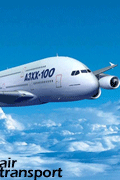Thursday, April 16, 2009
Thursday, April 16, 2009 - U.S. airlines carried 51.5 million scheduled domestic and international passengers in January 2009, 10.9 percent less than they did in January 2008, the U.S. Department of Transportation's Bureau of Transportation Statistics (BTS) today reported in a release of preliminary data.
BTS, a part of DOT's Research and Innovative Technology Administration, reported that the decline was the 11th consecutive monthly decrease in system passengers from the same month of the previous year.
U.S. airlines carried 11.5 percent fewer domestic passengers and 7.2 percent fewer international passengers in January 2009 than in January 2008. These passengers traveled on planes with average load factors of 73.0 percent.
Top Airlines in January
Southwest Airlines carried more total system and domestic passengers in January 2009 than any other airline and American Airlines carried more international passengers.
Top Airports in January
More total system and domestic passengers boarded planes in January 2009 at Atlanta Hartsfield-Jackson International than at any other U.S. airport more international passengers boarded U.S. carriers at Miami International than at any other U.S. airport
Flights Operated
U.S. carriers operated 769,500 domestic and international flights in January 2009, 11.2 percent fewer than in January 2008. Domestic flights were down 11.6 percent from January of the previous year while international flights fell 7.5 percent
System Comparisons
In other total system comparisons from January 2008 to January 2009 :
Revenue passenger miles (RPMs), a measure of the number of passengers and the distance flown, were down 9.9 percent in January 2009.
Available seat-miles (ASMs), a measure of airline capacity using the number of seats and the distance flown, were down 8.8 percent in January 2009.
Passenger load factor, passenger miles as a proportion of available seat-miles, was down 0.9 load factor points at 73.0 percent in January 2009.
Flight stage length, the average non-stop distance flown per departure, was up 0.4 percent in January 2009.
Passenger trip length, the average distance flown per passenger, was up 1.1 percent in January 2009.
Among U.S. airlines, Southwest Airlines carried 7.0 million passengers on its system in January 2009, the most of any airline.
Among airports, Atlanta Hartsfield-Jackson International was the busiest U.S. airport in January 2009, with 3.1 million domestic and international passenger boardings on U. S. carriers.
BTS, a part of DOT's Research and Innovative Technology Administration, reported that the decline was the 11th consecutive monthly decrease in system passengers from the same month of the previous year.
U.S. airlines carried 11.5 percent fewer domestic passengers and 7.2 percent fewer international passengers in January 2009 than in January 2008. These passengers traveled on planes with average load factors of 73.0 percent.
Top Airlines in January
Southwest Airlines carried more total system and domestic passengers in January 2009 than any other airline and American Airlines carried more international passengers.
Top Airports in January
More total system and domestic passengers boarded planes in January 2009 at Atlanta Hartsfield-Jackson International than at any other U.S. airport more international passengers boarded U.S. carriers at Miami International than at any other U.S. airport
Flights Operated
U.S. carriers operated 769,500 domestic and international flights in January 2009, 11.2 percent fewer than in January 2008. Domestic flights were down 11.6 percent from January of the previous year while international flights fell 7.5 percent
System Comparisons
In other total system comparisons from January 2008 to January 2009 :
Revenue passenger miles (RPMs), a measure of the number of passengers and the distance flown, were down 9.9 percent in January 2009.
Available seat-miles (ASMs), a measure of airline capacity using the number of seats and the distance flown, were down 8.8 percent in January 2009.
Passenger load factor, passenger miles as a proportion of available seat-miles, was down 0.9 load factor points at 73.0 percent in January 2009.
Flight stage length, the average non-stop distance flown per departure, was up 0.4 percent in January 2009.
Passenger trip length, the average distance flown per passenger, was up 1.1 percent in January 2009.
Among U.S. airlines, Southwest Airlines carried 7.0 million passengers on its system in January 2009, the most of any airline.
Among airports, Atlanta Hartsfield-Jackson International was the busiest U.S. airport in January 2009, with 3.1 million domestic and international passenger boardings on U. S. carriers.
Labels: January 2009 Airline Traffic
posted by transport blogs
@ 10:50 PM
permanent link | Post a Comment
|
![]()









